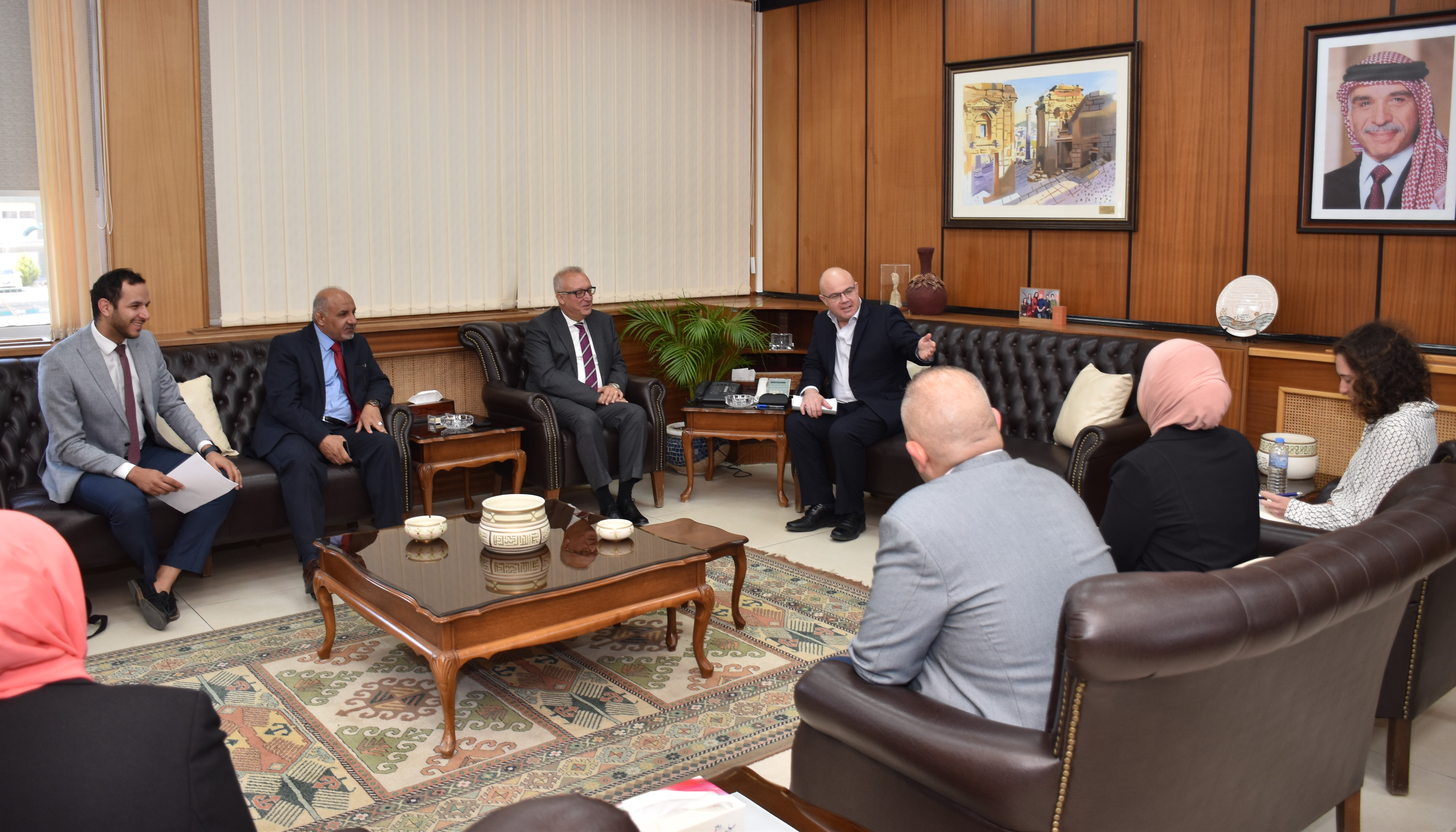The President of Yarmouk University, Professor Dr. Islam Massad, received a delegation from the Ministry of Education, and the Queen Rania Foundation for Education and Development. The delegation included Dr. Majid Al-Zyoud, Head of the Educational Research Department at the Ministry, Dr. Tamara Al-Hajaya, Head of the Educational Development Department at the Ministry, and Dr. Robert Palmer, Executive Director of the Research and Program Development Department at the Queen Rania Foundation. This visit aimed to enhance applied research cooperation in the educational field between Yarmouk University, the Queen Rania Foundation, and the Ministry of Education.
Massad pointed out that the outputs of the Jordanian higher education system have always allured competent human resources from various Arab countries due to its efficiency and excellence in various fields. He emphasized the imperative for all ministries and institutions in Jordan to collaborate, aiming to rejuvenate our human capital. This systematic effort begins with preparing school-level inputs meticulously to ensure outputs capable of pursuing higher education, acquiring scientific, creative, and leadership skills. These competencies enable graduates to undertake developmental roles post-graduation.
He also emphasized the importance of achieving a stronger connection between academic institutions and the governmental sector in a structured manner. This connection should serve as a robust investment, drawing upon the expertise of academic faculty, scholars, and higher education students. The aim is to foster research endeavors capable of addressing real-world problems across various societal domains.
Massad affirmed Yarmouk's readiness to cooperate with the Queen Rania Foundation and harness its researchers from various disciplines to collaborate with the Foundation in implementing its project aimed at enhancing research partnership between universities and the Ministry of Education, especially since Yarmouk hosts a Faculty of Educational Sciences that embraces academic figures and graduate students who have consistently demonstrated their excellence and ability to conduct scientific research aligned with the needs of educational institutions such as the Ministry of Education and the National Center for Curriculum Development.
Massad stressed the importance of placing study and research outcomes in the hands of decision-makers and policy developers. This enables them to adopt best practices, make informed decisions, and formulate an executable plan, thereby reaching a solution to the problem or effectively confronting the challenges facing society in a given context.
Al-Zyoud, on his part, confirmed the Ministry of Education's readiness to cooperate with Jordanian universities and coordinate with their faculties of education regarding harnessing educational research to enrich educational policies and address research gaps.
Palmer emphasized the importance of collaboration with a distinguished academic institution like Yarmouk University, which includes highly competent faculty members, researchers, and students capable of conducting rigorous scientific research. He stressed the necessity of unifying efforts between the Ministry of Education, the Ministry of Higher Education, and universities to achieve an integrated educational system and the importance of activating the role of the higher education sector in Jordan and involving it in guiding governmental decisions regarding educational policies.
Palmer explained that the Foundation seeks to implement a partnership project aimed at increasing the participation of educational researchers in public and private universities in Jordan in specific research topics and questions relevant to educational policies. This includes defining approaches and mechanisms to enhance the research relationship between universities and the Ministry of Education in the field of educational research, involving university researchers in capacity-building activities through experiential learning, offering a series of short training courses for university researchers and research team members from the Ministry of Education, and organizing forums and discussion sessions bringing together university researchers and educational policymakers.
He emphasized the Foundation's persistent efforts towards achieving quality education for all children, especially as it is the path to their future success, indicating that the Foundation identifies gaps in the education system and seeks effective solutions through providing necessary data and research to make evidence-based decisions.
The meeting was attended by the Vice Presidents of the University, Dr. Samer Samara and Dr. Musa Rbabah, and the Deans of the faculties: Dr. Ahmed Al-Sharifin for Educational Sciences, Dr. Moufaq Al-Atoum for Engineering, and Dr. Mohammed Al-Zubaidi for Research and Graduate Studies, along with Taline Sabeela and Anas Gulghasi from the Queen Rania Foundation.
During their visit to the university, the delegation members met with the Dean of the Faculty of Educational Sciences, Dr. Ahmed Al-Sharifin, and the faculty members, where they discussed ways of research cooperation between the faculty and the Ministry of Education through faculty members and graduate students.
